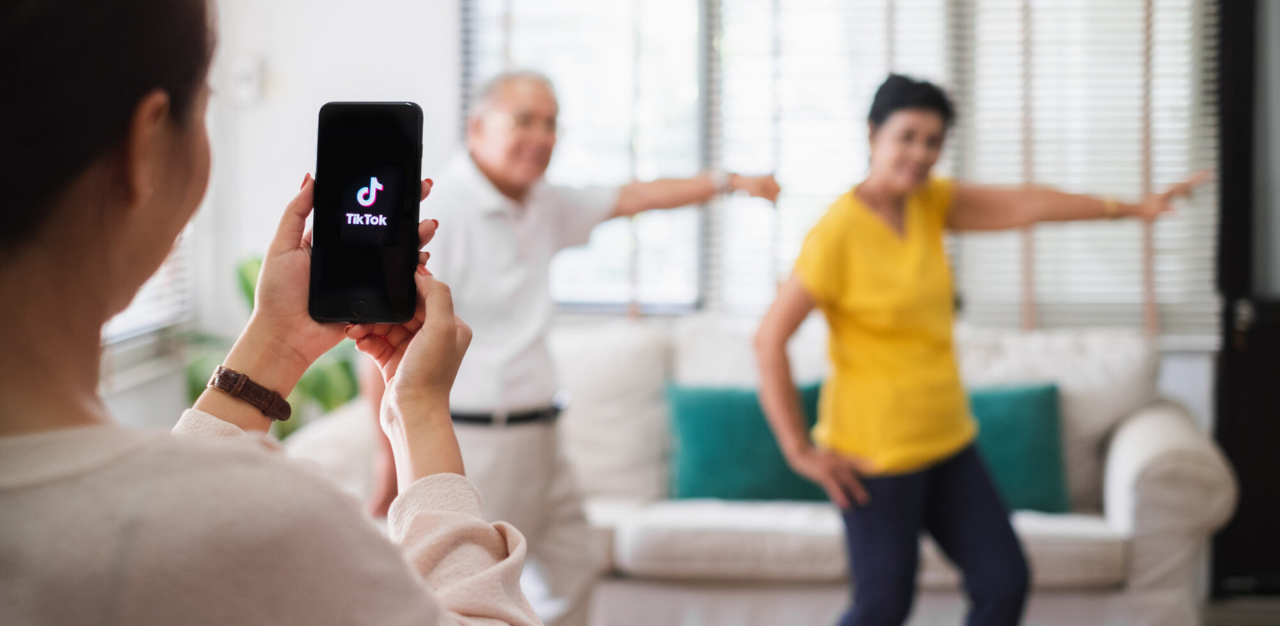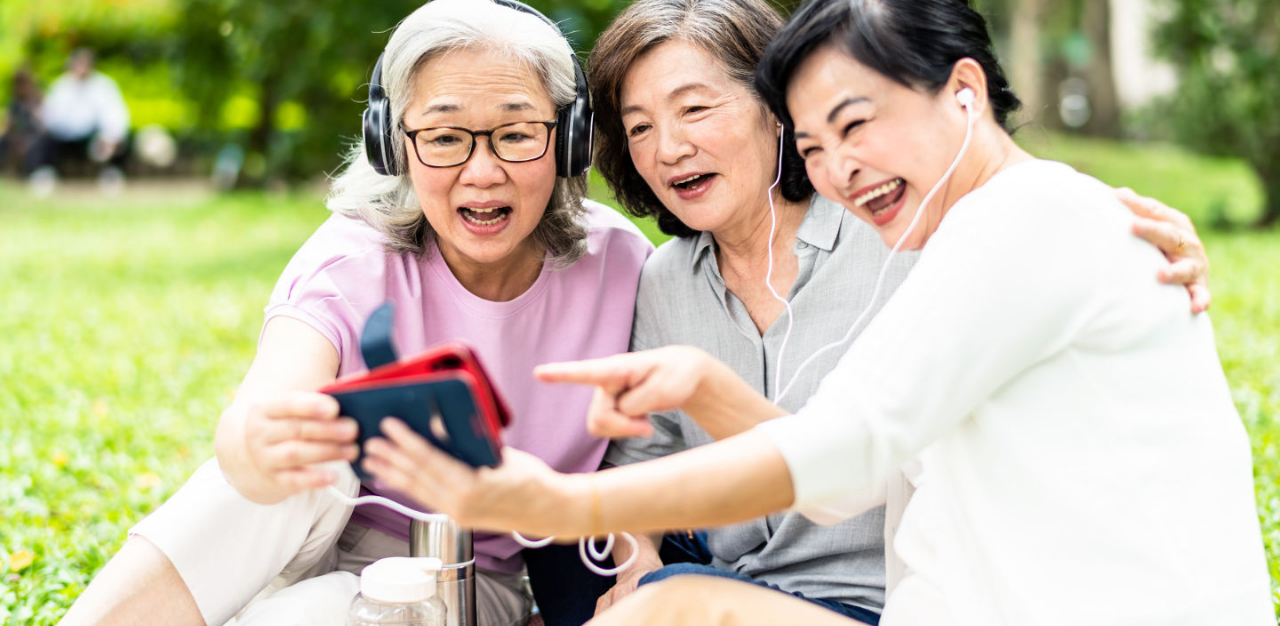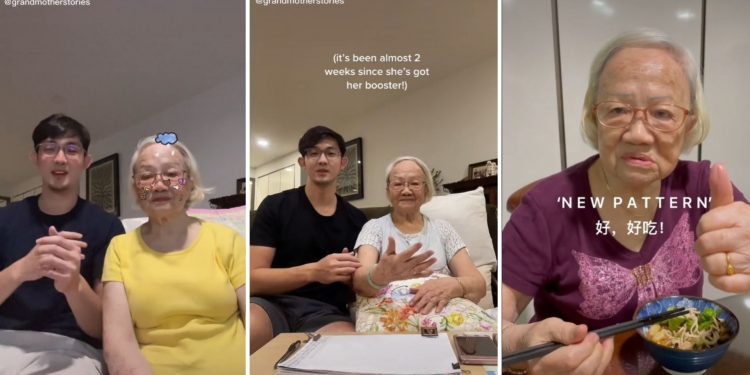Madam Wan Soon Moi is, you could say, an 89-year-young TikTok star. She is on TikTok every day as the leading “actress” of @grandmotherstories, managed by her grandson Josiah Leong.
But wait.
When one thinks of TikTok, videos of young kids doing funny dances, lip-synching, and horsing around come to mind. About a third of TikTok users in the United States are under 20, according to a June 2020 Statistica Report.

However, the TikTok age demographic is slowly trending upwards, with tens of millions of adults in the US using the application for entertainment and to express themselves. Many on TikTok also share videos on an array of topics beyond what stereotypes suggest — food, fitness, relationships, fashion, and politics — turning TikTok into an engaging social media application with diverse contents.
Interestingly, there have also been some seniors, like Madam Wan who have become stars on TikTok. In fact, her account @grandmotherstories has reached thousands at minimum and has even gone up to 2.8 million views. Her grandson Mr Leong, 31, uploads his day-to-day interactions with his grandmother – often “some really precious moments” that are fortunately recorded – as well as the occasional TikTok dance trends that Madam Wan joyfully partakes in.
Like Madam Wan, many seniors on TikTok are featured mostly in videos made by their grandkids and Mr Leong says Madam Wan “definitely feels happy to be a part of TikTok”, and it seems like other seniors who are on the app enjoy it too.
So, is TikTok, a video-based social network that’s popular with teens and younger adults, a beneficial app for seniors too? Should more of them join TikTok?
Why seniors are joining TikTok

Some older adults use TikTok as a platform to bond with their kids and grandkids, others just want to discover what the younger generation is up to.
For Madam Wan and Mr Leong, TikTok has “given [us] a little more reason to spend time together”. Mr Leong says that most of the elderly in Singapore are not entirely sure of what social media entails, or are still trying to grasp the mechanics of these applications. For them, making TikTok videos is really more about spending time with their loved ones.
Mr Leong says that in @grandmotherstories, most of the recorded moments are candid, genuine and natural. Apart from the ones chasing actual TikTok trends where specific moves are required, “grandma often just interacts with me just as how she usually does on a day to day basis — the by-product being that some of it is recorded”.
“Spending time together, recorded or not, is something that she deeply appreciates at this age,” the associate at DP Architects adds.
Mr Leong also jokes that being a TikTok star “fulfils her childhood ambition of being a singer and actor in a small way too”.
TikTok also got some elderly moving and grooving to certain dance challenges. In a video posted by St Hilda’s Community Services, two elderly were recorded doing their rendition of the “Go Daddy Go” challenge, and it garnered over 300,000 views. Madam also enjoys the occasional rhythmic gestures; according to Mr Leong, though she always says that she will need more practice and may give up mid-way. It makes for good videos nonetheless.
Inspiring intergenerational bonding
@grandmotherstories ❤️👑❤️
When TikTok wasn’t around then, Mr Leong was already featuring Madam Wan on his Instagram stories since 2016. There, she grew extremely popular among his friends, and he noticed a large number of friends responding to stories featuring her, even expressing their die-hard “fan-ship” for her.
When TikTok started, Mr Leong’s friends egged him on to start an account with his grandmother as the “main character”.
“Because of the way my friends were raving about grandma on my Instagram stories, I knew that there is a possibility of the account gaining traction,” he says.
However, it is not cute antics or dance moves that made their videos a hit. Videos involving simple conversations about life and how Madam Wan views the world are the ones that gained traction, catching them by surprise.
“Relatability seems to be key, and audiences on TikTok are often drawn to seeing the genuine interactions between us both. They can somehow tell if the interactions are genuine,” Mr Leong adds.
Many Singaporeans have commented on their videos, saying how much they remind them of their own grandparents and that the videos serve as solid reminders to spend time with their loved ones. The videos have also brought Mr Leong’s parents, aunts, and uncles closer together. They would often share these videos through their WhatsApp family chats and laugh along with Madam Wan.
Mr Leong says that his grandmother’s friends have also expressed their happiness for her, congratulating her for being so “well-loved by her family”. It is not the stardom that these seniors are envious of, but the close relationship that Mr Leong and Madam Wan has forged.
“[For many of the elderly], having family care for them is a far more pressing and real desire,” he adds.
For Mr Leong, doing TikTok with his grandmother has affirmed his mantra of loving others and prioritising his loved ones’ needs, sometimes even above his own.
“We live in a society that teaches us to fend for and take care of ourselves, so much so that we quite naturally put ourselves – our needs and desires – above all else,” he says. “Loving others and fending for them – above yourself – can sometimes be a lot more fulfilling than you think”.
Helping the elderly to overcome their fear of technology

@grandmotherstories is certainly a positive example of how technology can not only help the elderly keep up with times and allay their fear of mechanisation, but also build stronger relationships with their loved ones.
Ms Lynn Ng, clinical psychologist at Annabelle Psychology, says that it is beneficial for the elderly to use social media platforms like TikTok to stay connected and keep up with society. At the same time, they may be able to find and reconnect with their (long-lost) friends.
“With the ongoing COVID-19 situation, more and more elderly do not fear technology as much. They realise how technology can bridge physical distance and bring them out of isolation,” Ms Ng says.
However, Ms Ng says that there is still a group of elderly who continue to fear technology. For these elderly, especially with COVID-19 measures kicking in at the start of the pandemic, they experience sudden isolation from family and social circles as they are not familiar with the use of smartphones, tablets, and social media applications.
Ms Ng recommends that adults and young people help these elderly to get rid of their fear of technology, especially when they need to be digitally connected to the rest of the world.
“For many of these elderly, they fear the unknown and learning new skills later in life is more challenging as compared to learning new skills at a younger age. They would require more practice, repetition, and reminders to learn how to navigate the apps and overcome problems associated with the use of technology,” the clinical psychologist adds.
Ms Ng says that having young people introduce such digital platforms like TikTok to the elderly will also help forge closer relationships.
To guide the elderly in embracing technology, Ms Ng advises that young people need to be patient in teaching them and helping them out whenever they ask for guidance. It is also important to let the elderly try to navigate the digital tools on their own without judgement, so that they can gain confidence and open up to the benefits of using digital platforms and tools, she adds.
Join the conversations on TheHomeGround Asia’s Facebook and Instagram, and get the latest updates via Telegram.














